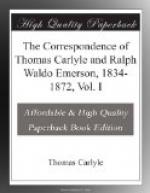------------- * Ralph Waldo Emerson. Recollections of his Visits to England By Alexander Ireland. London, 1882, p. 58. ------------
Twenty-three years later, in his “English Traits,” Emerson once more describes his visit, and tells of his impressions of Carlyle.
“From Edinburgh I went to the Highlands. On my return I came from Glasgow to Dumfries, and being intent on delivering a letter which I had brought from Rome, inquired for Craigenputtock. It was a farm in Nithsdale, in the parish of Dunscore, sixteen miles distant. No public coach passed near it, so I took a private carriage from the inn. I found the house amid desolate heathery hills, where the lonely scholar nourished his mighty heart. Carlyle was a man from his youth, an author who did not need to hide from his readers, and as absolute a man of the world, unknown and exiled on that hill-farm, as if holding on his own terms what is best in London. He was tall and gaunt, with a cliff-like brow, self-possessed and holding his extraordinary powers of conversation in easy command; clinging to his northern accent with evident relish; full of lively anecdote, and with a streaming humor which floated everything he looked upon. His talk, playfully exalting the most familiar objects, put the companion at once into an acquaintance with his Lars and Lemurs, and it was very pleasant to learn what was predestined to be a pretty mythology. Few were the objects and lonely the man, ’not a person to speak to within sixteen miles, except the minister of Dunscore’; so that books inevitably made his topics.
“He had names of his own for all the matters familiar to his discourse. Blackwood’s was the ‘sand magazine’; Fraser’s nearer approach to possibility of life was the ‘mud magazine’; a piece of road near by that marked some failed enterprise was ’the grave of the last sixpence.’ When too much praise of any genius annoyed him, he professed hugely to admire the talent shown by his pig. He had spent much time and contrivance in confining the poor beast to one enclosure in his Pen; but pig, by great strokes of judgment, had found out how to let a board down, and had foiled him. For all that, he still thought




